When the Pako broke the “fishing rod”.
Ms. Truong Thi Nhung and Mr. Van Duc Tien’s dried banana processing plant in Trung Chinh Clump, Lao Bao City, Huong Hoa District, Quang Tri Province currently employs 30 workers. This room was purchased by Nhung and her husband from a company a few years ago.
Previously, Nhung and her husband would go to the Lao Bao border gate all year round to trade in agricultural and forestry products. Her family life is not rich, but she has enough.
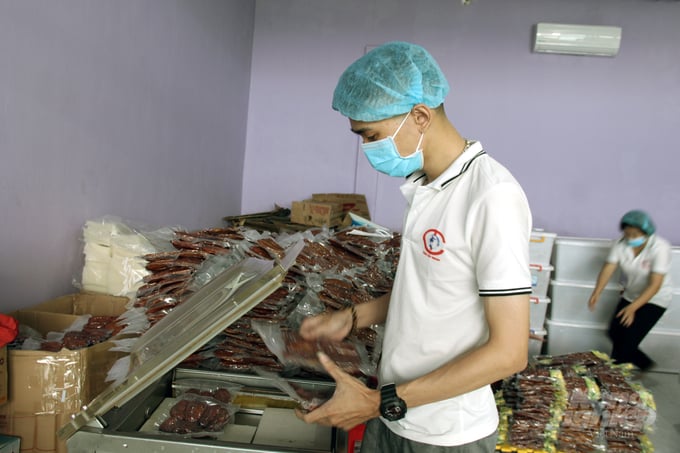
Lao Bao’s dried banana specialty was born from the start-up idea of Ms. Nhung and her husband. Photo: From crap.
However, in late 2020, Ms. Nhung and her husband made a decision that surprised many people when they invested in three moldy banana drying lines. That was the time when banana honey mold was “plugged up” for export to China, Thailand… Thousands of hectares of banana mold in Huong Hoa district and some neighboring districts and Laos. Humans could be infected by humans.
Few know that this idea and decision arose out of empathy for the lives of ethnic minorities who lived year-round in rice and banana gardens in the highlands.
“By the way, during a trip I saw how many households cut down banana gardens. The ripe yellow bananas are only used to feed livestock. No one wants to bring it to Tan Long market for sale, because each kilogram of bananas can only be sold between 1 and 1.5 thousand dong, not worth chopping and carrying. At this point, I’m just thinking about consuming for humans. But when I collect fresh bananas for my relatives, I don’t know where to sell them. But if it’s a dried banana, it can be stored for 6 months,” Nhung said of her predestined relationship with opening a flexible banana drying facility.
Bananas are not only grown in Tan Long, Tan Lien… in Huong Hoa district, but also many households come to Laos to grow them and import them for traders. Through the Lao Bao international border gate, bananas are bought by traders and transported to the south, north, China and Thailand. However, during the Covid-19 epidemic, many traders in Huong Hoa stopped buying.
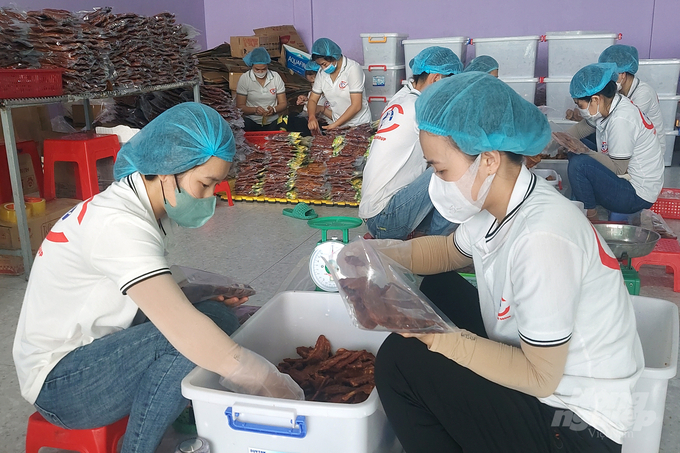
Ms. Nhung and her husband’s dry banana factory provides jobs for 30 local workers. Photo: From crap.
After some time, people were cutting bananas and taking them to Tan Long market for sale, but they were still impatient. Banana gardens are carelessly neglected, turning yellow, grass grows up to the knees. Many banana plantation owners in Laos collapsed in debt and returned empty-handed.
Many workers from Laos returned home without work, and many banana areas had to be cleared. But in the country of Huong Hoa, for the Pako Van Kieu ethnic group, there is nothing easier to grow and more effective than the banana tree. Banana trees used to be the main source of income for the Pako Van Kieu ethnic groups. Many households shook their heads in disgust as they considered switching to other crops.
In early 2021, two steam lines and one thermoplastic drying line for bananas were fully installed and put into operation by Ms. Nhung and her husband. But the road ahead is also challenging when the only product is dried bananas, which are removed to meet people’s small needs.
“If you leave it, you will love it, if you leave it, you will be guilty”, Investing billions in 3 banana drying lines, Nhung and her husband can’t throw money down the drain…
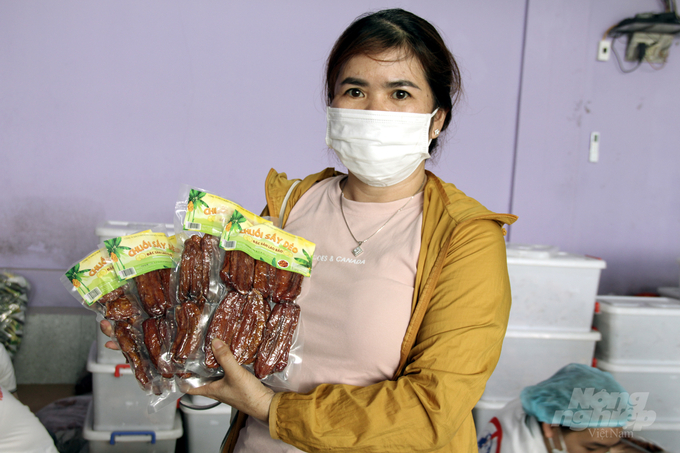
Ms. Nhung said that dried specialty bananas from Lao Bao have been well received by consumers. Photo: From crap.
“Line drying is a bit more complicated than heat (cold) drying, but we are forced to use both methods to meet demand and retain customers. For a facility that has never processed agricultural products, we need to experiment and learn at the same time. Fortunately, the product and output are stable now. Products are almost sold out. If we find larger orders, we will continue to increase our capacity as there are plentiful raw materials and available labor here,” Nhung shared.
Realize the idea of ”doing nothing” from the banana tree
Every day, Ms. Nhung’s family’s dried banana processing plant processes 4-5 tons of ingredients from local people and produces nearly 1 ton of Lao Bao specialty brand dried banana products. The products are certified to meet food safety and hygiene conditions from VietGAP certified raw materials, without additives and soon a 4-star OCOP product. Almost all of Nhung and her husband’s dried banana products are processed and sold out, but few know that they were very difficult to consume in the early days.
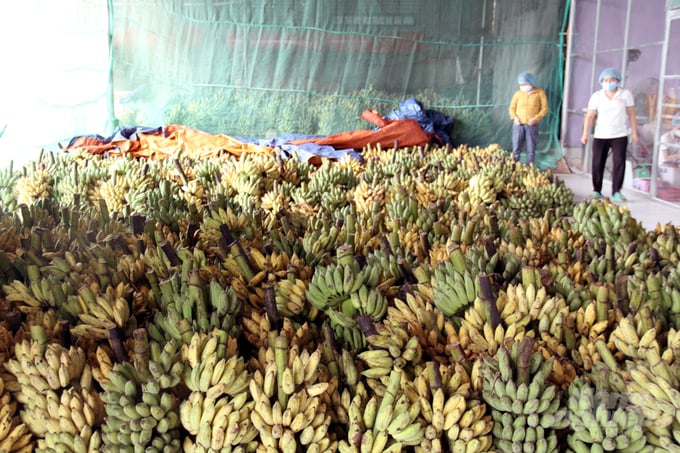
Nhung’s family of dried flexible bananas solves stable production for hundreds of households growing moldy bananas in Huong Hoa district. Photo: From crap.
“We just think, dry it to make it last longer and sell it slowly. But the pressure is increasing every day, forcing us to sell through the Internet. Users are unfamiliar with dried bananas while we have no experience in selling them online, so they face many difficulties. But fortunately the product has a stable output up to this point. We promote the south and north market to gradually increase the processing capacity and solve the problem of farm products for farmers,” Nhung said.
According to Ms. Nhung, Lao Bao’s dried bananas do not use any additives and preservatives, but are simply dried by heat and steam, vacuum-packed, they can be stored for 6 months under normal temperature conditions. Hence, the product is very safe and good for dieters and people with diabetes.
In addition to the focal point contracts for the purchase, Nhung and her husband are currently working with humans to grow 5ha of moldy bananas and have been certified to meet VietGAP standards. In the near future, this area will deal with part of the raw materials for processing. Households participating in the association with Ms. Nhung and her husband will be supported in the form of deferred loans for fertilizers and the purchase of all qualifying products.
“The area associated with the product is completely different from bananas that people grow themselves, the fruit is larger, the flesh and the chamber longer. We intend to further increase the connection area so that people benefit together and the economy per unit area is increased. This is a task to prepare the plan to increase the capacity of dried bananas towards bigger markets with more products made from bananas,” Nhung shared her future plans.
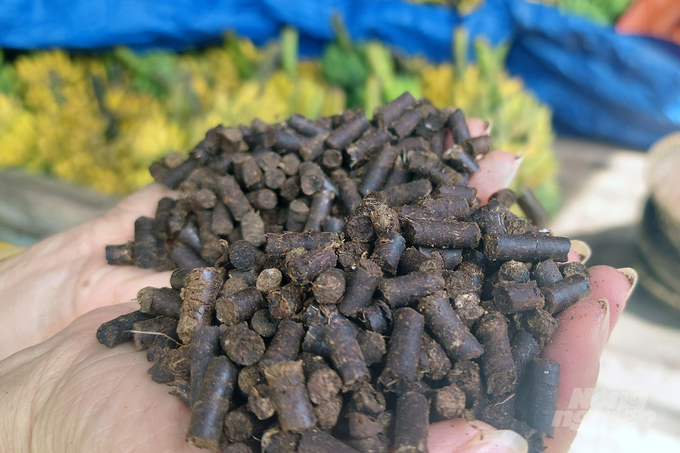
The first batches of organic fertilizer made from the byproducts of banana drying were born. Photo: From crap.
Initially, Nhung’s family threw away the by-products from the banana vault, such as the peel and stem of the banana vault. However, the pressure of environmental problems from the decomposition of banana peels made Nhung and her husband think, “Why don’t we use these by-products to give back to the country? They are not poisonous but, on the contrary, increase the fertility of the soil.”
One idea after the other came up. Nhung and her husband put together an organic fertilizer production line. By-products of the production process are collected and piled up to be used in fertilizer production. Ms. Nhung came up with the idea of investing in deferred payment fertilizers for low-priced households, which would be gradually withdrawn from banana purchases.
“Currently, the amount of fertilizer we produce is being tested on an area of 5 hectares in cooperation with people. When the fertilizer has met the conditions for sale on the market, we will increase our capacity so that not only banana drying is profitable, but also fertilizer production efficiency is profitable. It is one of the prerequisites for us to think about higher goals in the future,” Ms. Nhung shared of the upcoming goal.
“The branch of Ms. Nhung and her husband helps the place to solve the local labor problem. Importantly, drying bananas solves the agricultural product consumption problem for farmers, sustainably increases economic efficiency, and protects the environment. This model must be encouraged and supported by measures to diversify products into larger developing markets,” said Mr. Le Ba Hung, chairman of the Lao Bao City People’s Committee.

